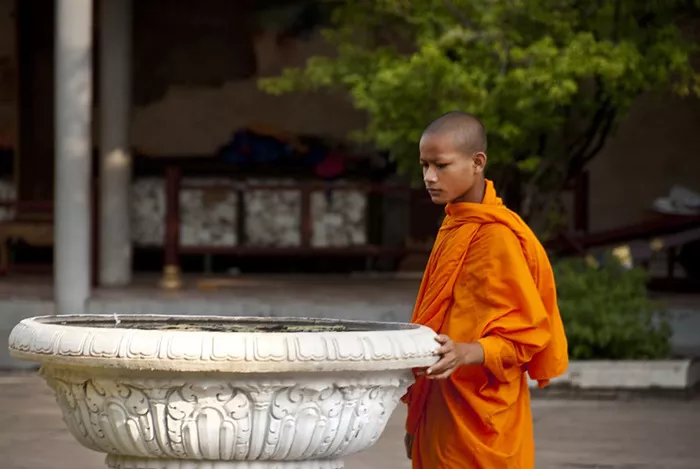Buddhism is one of the world’s oldest religions. It started over 2,500 years ago in India. Unlike many religions, Buddhism does not focus on worshipping a god or gods. Instead, it teaches people how to understand life and reach peace inside themselves. This often confuses people who ask, “What god do monks believe in?”
Who Are Monks in Buddhism?
Monks are people who choose to live a special life following the Buddha’s teachings. They live simply, meditate, and try to help others. Monks do not worship gods like in some other religions. Their focus is on their own mind and actions.
Does Buddhism Believe in a God?
In Buddhism, there is no single creator god who rules everything. Buddhism is often called a non-theistic religion. This means it does not depend on a god for meaning or salvation. Instead, it teaches that each person can find their own path to freedom from suffering.
The Buddha and His Role
The Buddha is not a god. He was a human being who found deep wisdom and peace. He taught others how to live better lives and reach enlightenment, which means waking up to the true nature of life. Buddhists respect the Buddha but do not pray to him as a god.
Other Beings in Buddhist Stories
Sometimes, you hear about gods or spirits in Buddhist stories. These beings exist in Buddhist cosmology, but they are not eternal or all-powerful gods. They live in different realms and, like humans, can be reborn in other forms. They are not worshipped as supreme beings but are respected as part of the universe.
What Do Monks Focus on Instead of Gods?
Monks focus on understanding the mind and following the Buddha’s teachings. Their goal is to end suffering by practicing morality, meditation, and wisdom. They follow the Four Noble Truths and the Eightfold Path, which guide how to live well.
The Four Noble Truths
These truths explain that life has suffering, suffering comes from desire, suffering can end, and there is a path to stop suffering. Monks study and practice these truths every day.
The Eightfold Path
The Eightfold Path is a guide for ethical and mental development. It includes right understanding, right intention, right speech, right action, right livelihood, right effort, right mindfulness, and right concentration.
Different Views in Buddhist Traditions
Buddhism has many traditions, such as Theravada, Mahayana, and Vajrayana. Their views about gods and spiritual beings can vary, but none worship a creator god like in theism.
Theravada Buddhism
Theravada monks focus on the original teachings of the Buddha. They do not pray to gods but may respect devas (heavenly beings) as part of nature. Their main practice is meditation and moral discipline.
Mahayana Buddhism
Mahayana includes many different practices. Some forms honor bodhisattvas—enlightened beings who help others reach enlightenment. Bodhisattvas are not gods but are deeply respected. People may ask for their help, but this is different from worshipping a god.
Vajrayana Buddhism
Vajrayana, or Tibetan Buddhism, has many rituals and symbols. It includes deities called yidams, but these are seen as representations of enlightened qualities, not gods who control the universe. Monks use these deities to focus their meditation and understand deeper truths.
Why Do People Think Buddhists Believe in Gods?
Sometimes, Buddhist festivals or temples show images of gods or spirits. This can confuse people. These gods are often part of local culture or symbolic figures. They are not worshipped as creators but respected as part of the spiritual world.
Buddhism and Local Beliefs
In many countries, Buddhism blends with local beliefs and traditions. For example, in some places, Buddhist temples also honor local gods. This does not change core Buddhist teachings but shows how Buddhism adapts to different cultures.
What Monks Teach About Self and Reality
Monks teach that the idea of a permanent self or soul is an illusion. Life is always changing. Understanding this helps people reduce attachment and suffering. This teaching is called anatta or “no-self.”
The Cycle of Rebirth
Buddhism teaches about rebirth, where beings are born again in different forms. This is not controlled by a god but by karma, which means the effects of actions. Good actions bring good results, and bad actions bring suffering. Monks try to break free from this cycle by reaching enlightenment.
How Do Monks Practice Their Faith Without Belief in God?
Monks live by example. They meditate to calm the mind and see things clearly. They follow ethical rules to live kindly and avoid harm. They teach others to understand suffering and how to end it.
Meditation and Mindfulness
Meditation is central to a monk’s life. It helps them observe their thoughts and feelings without getting caught up in them. Mindfulness means paying close attention to the present moment. These practices lead to wisdom and peace.
Ethical Conduct
Monks follow strict moral rules. These rules guide them to be honest, peaceful, and helpful. Ethical living supports meditation and understanding.
Conclusion
In summary, Buddhist monks do not believe in a god like in many other religions. They follow the teachings of the Buddha, who showed a way to end suffering. Monks respect many spiritual beings but do not worship gods as creators or rulers. Their faith is based on practice, understanding, and inner peace, not belief in a god.

